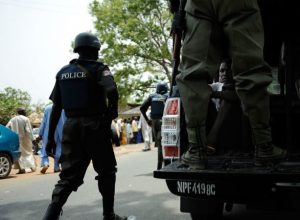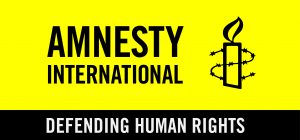In January 2010, I was one of the students of the University of Nigeria Nsukka who took to the streets to protest the hike in school fees by the Prof Bartholomew Okolo administration. The protests took us through major streets in Nsukka before we eventually marched to Opi junction, blocking the expressway for hours, singing and chanting “Bartho Okolo must go.” The widely popular protests happened on Saturday, January 16 2010.
The next day, anti-riot policemen were deployed to chase the students out of the hostels following the suspension of academic activities by the school management. I was not particularly frightened by the presence of policemen all over campus whipping students and threatening to shoot us if we failed to comply with the university administration’s directive. I challenged two policemen I saw maltreating students around Eni Njoku Hostel telling them that they had no power to whip students on campus. I threatened to mobilise students against them unless they let the students go.

One of them threatened to shoot me if I don’t leave the place, accusing me of being a cultist and “one of those irresponsible students instigating trouble in the campus.” His colleague who looked older and more decent called me aside and advised that instead of mobilising the students to demonstrate against the police officers, that I should rather join them and plead with the students to go home and wait for further directives from the Vice-Chancellor and his team. I told him that I would not be able to do that as that would mean betraying the students who I led to Opi the previous day. I explained the situation to him, telling him that it was unfair for the Bartholomew Okolo administration to arbitrarily hike acceptance fee from N8, 000 to N20, 000. I told the officer that so many of the students were not protesting because they were directly involved, I showed him my student’s identification card and pointed him to the fact that I was a final year student who would never have to pay either the new school fees or even acceptance fee ever again. “This is for those coming after us,” I told him.
It was then that he took me farther away from his colleague and bared his mind to me. He told me that two of his sons just gained admission into the school and that he had been disturbed with reports of the hike in fees, revealing that his salary as a police officer was too meagre to accommodate the rising cost of university education. He told me that he was very happy with the protests and the nationwide coverage it got in the media. However, he advised that our voice had been heard and that we must go home at once to avoid an unnecessary escalation. I was trying to respond to his entreaties when he said something that struck me. “The police commissioner, at the request of your VC would be sending SARS officials in the next hour if things don’t calm down immediately. I would not wish SARS treatment on my enemy.” He went on to reveal that SARS officials were “heartless, bloodthirsty and largely unreasonable. None of you would want to deal with them.”

Let us not dissipate energy arguing the propriety or otherwise of inviting men of the Special Anti-Robbery Squad (SARS) to suppress students’ demonstration. Rather, spare a moment to think about the confession made by a police officer that his colleagues in SARS were “heartless, bloodthirsty and largely unreasonable.”
It is sad that ten years after this revelation was made by a man who knows the workings of SARS, things have rather gotten worse with the officials killing citizens at random, extorting young men and doing every unimaginable thing to give the police and Nigeria a bad name. From Ogidi in Anambra state to Ikeja and “Abattoir” in Abuja, tales of torture, coercion, extortion and extrajudicial killings by SARS operatives abound.
In Lagos and several parts of southern Nigeria and Abuja, SARS official mount roadblocks where all sorts of illegalities take place. The men who look and dress like dangerous criminals force young Nigerians to unlock their mobile phones, show them their account balances and as reported severally by scores of young men who had had encounters with them, forced to transfer certain amounts to the officers or be arrested and branded criminals thereby forcing their relatives to pay even double to secure the release of the individuals or risk having them killed.

Amnesty International in 2016 reported that in SARS detention centres all across the country, inmates are randomly taken out and shot even before they are brought to court for trial. The report which generated nation-wide outcry at the time pointed to a “culture of torture,” extortion and brutality which reign supreme in the SARS cells across the country. There were reports of beating suspects with whips and rifle butts while in some cases, they are forced to walk on barefoot over broken bottles or sit on benches of nails. Hanging inmates upside down and using electric shocks as a torture tool to extract confessions are also common.
Omoyele Sowore, activist and publisher of Sahara Reporters revealed in a recent tweet that in 1998 when he was arrested for taking part in a protest at the University of Lagos and taken to SARS cell in Ikeja, he found that all the inmates had been shot below the ankle. A former inmate at SARS cell in Dugbe, Ibadan also reported that daily, several suspects were shot and their bodies disposed of without any form of accounting.
Amnesty International questioned why SARS, whose original purview is largely restricted to fighting armed robbery in the country often lends itself to civil matters, allowing its officials to be called into land disagreements, debt collection and even, family disputes. These duties, Amnesty learnt are done illegally without passing through the record books thereby opening a very profitable channel for exploitation, corrupt enrichment and abuse of police functions.
SARS, according to a recent report published in the media, has become the “juiciest” department in the Nigeria Police Force with officers paying bribes in hundreds of thousands of naira to be posted to SARS. It is believed that whatever is spent securing a favourable posting to SARS is recovered in a few months by undertaking a few illegal jobs or through the exploitation of citizens like what we find in Lagos streets. SARS reputation for brutality, disdain for due process and knack for extrajudicial killing has made it very attractive to persons who want to either exact a pound of flesh for a perceived injustice, settle a business dispute or “deal” with an enemy. Question is: why would a responsible police force allow such a reputation to fester?
#EndSARS Protest currently on going in Sagamu to protest the killing of Tiamiyu Kazeem pic.twitter.com/aZ7ffzmsNd
— Zamora (@orladhortun) February 24, 2020
While reports of exploitation, harassment and intimidation of Nigerians by SARS officials with very little consequences provide a very sad commentary on the state of affairs in the country, what many consider quite atrocious is the rate at which these officials kill innocent Nigerians at little or no provocation. The recent murder of budding footballer, Tiyamiyu Kazeem, by SARS operatives in Sagamu has once again brought to the fore the unspeakable crimes against young Nigerians by men of the police force.
Kazeem, a young footballer whose father, Fasasi, revealed had signed a contract with a football club in Europe was allegedly pushed out of a moving vehicle last Saturday after he had been picked up from a supermarket where he had reportedly gone shopping for groceries. The assistant captain of Remo Stars Football Club is the latest victim of police brutality in the country and not unexpectedly, his death is raising further questions about the role of the police in the Nigerian society. Not done with orchestrating the death of the rising footballer, police on Monday according to reports in the Guardian newspaper shot and killed three persons in Sagamu who took to the streets to protest the killing of Kazeem.
Father of #KazeemTiyaminu gets hold of a SARS officer after they shot his son dead in Sagamu pic.twitter.com/Hft1U8pIdH
— Naijapals Gistmania (@Naijapals) February 24, 2020
Many are questioning why the police in the country regularly turn the guns against the very citizens they were recruited to protect and whose taxes buy their ammunition and pay their salaries. Analysts consider it strange that despite the public outcry against the activities of SARS, successive heads of the police formation in Nigeria have not deemed it fit to undertake a holistic reformation of the unit in particular and the entire force in general. Why is the term “accidental discharge” almost universally exclusive to the Nigerian Police? You would recall that in April last year; a young Nigerian Kolade Johnson was “accidentally shot at” at a football viewing centre in Lagos sparking nationwide protests. Police officials kill Nigerians on the streets, at checkpoints, relaxation spots, in their homes and as we saw on Monday, even when they protest.

Beyond tokenism and some “calm down” gestures, it is about time Nigerians began to clamour for serious and comprehensive reforms in the police force. It is unthinkable that police officers kill citizens randomly and for no just cause in a democracy. How on earth can police officials be known for extortion and daylight bribery? How about the speculations that criminals- including armed robbers and kidnappers work closely with police officials to cause nightmare for citizens?
For a start, the police authorities must ensure the prosecution of all its men and officers remotely involved in all forms of illegalities. Secondly, intense background checks should be carried on police recruits to keep the bad eggs away. Equally important is a proper re-orientation programme for men of the force. How can the psyche of the average police officer be changed from what it currently is? Citizens should also be encouraged and never get tired of protesting- on the streets and through social media platforms- against police brutality.
The message must ring clearly that no one- not even police officers- have any right to kill innocent Nigerians or any Nigerian at that without a proper trial in a court of competent jurisdiction. SARS must either subject itself to be laws of the land or be completely disbanded. Enough of the madness.
